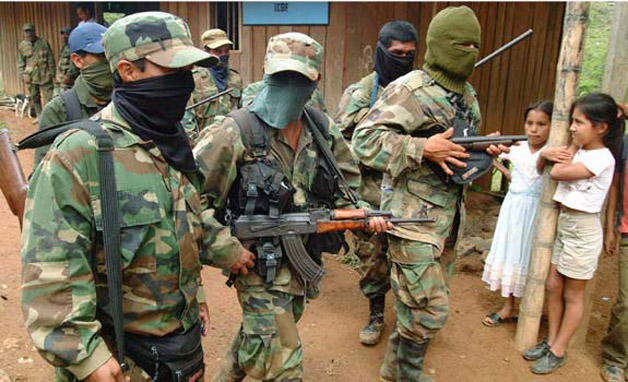
CASE STATUS
Active
HUMAN RIGHTS ISSUES
COUNTRY
One of Colombia’s most violent paramilitary commanders, known as Macaco, confessed to the murders of hundreds of civilians committed by the Bloque Central Bolívar (BCB), a paramilitary group he founded in the late 1980s and led until its demobilization in 2005. Yet he has never been held to account for these crimes. He was extradited to the United States in 2008 on drug charges, and has so far enjoyed impunity for his role in the widespread human rights atrocities committed under his command. For over a decade, CJA has sought to hold him accountable for torture and extrajudicial killing in U.S. court.
On the night of July 16, 2001, Eduardo Estrada and his partner were walking down a street in San Pablo, Colombia, when a paramilitary soldier approached the pair and shot Eduardo execution-style in the head. The shooting occurred near a local police station. A government soldier passed by Eduardo, lying bleeding on the ground. Neither the police nor the soldier provided assistance. It was only after his family arrived at the scene and flagged down a passing car that he finally made it to a hospital. He died that night.
Over a thousand people attended Eduardo’s funeral. He had been a leader of the social justice organization Program for Peace and Development in the Middle Magdalena (PDP) and an active member of his local community. His assassin was a member of the right-wing paramilitary group known as the Bloque Central Bolívar (BCB), which had overtaken Eduardo’s town of San Pablo since 1999. The BCB was founded and commanded by Carlos Mario Jiménez Naranjo, known as Macaco. Members of the BCB later confessed that they had been ordered to kill Eduardo because his activities to benefit his community, including his work as a PDP leader, threatened their control over the region.
Alma Rosa Jaramillo Lafourie was another victim of the BCB. Because of her work as a human rights attorney and a PDP leader, the BCB denounced her as a left-wing rebel sympathizer and repeatedly threatened her at her home. On July 1, 2001, parts of Alma Rosa’s body were recovered from a river. She had been tortured, mutilated, and dismembered.
In 2003, the BCB began to demobilize under the Colombian Justice and Peace Process. Macaco began to participate in this process in 2005 and admitted responsibility for over 400 violent crimes. Although Eduardo and Alma Rosa’s families sought accountability from Macaco through the transitional justice process in Colombia, their hopes for redress were abruptly ended in 2008 when Macaco was extradited to the United States to face prosecution for drug trafficking. Macaco was convicted on international drug trafficking charges and sentenced to 33 years in a Florida prison.
Eduardo and Alma Rosa were among the thousands of civilians who were killed or tortured by the BCB as part of its brutal campaign to control the Middle Magdalena region. The BCB’s violent reign was largely enabled by the collaboration with local state security forces, a symbiotic relationship between state actors and the paramilitaries that was common in the Middle Magdalena region. Neither Macaco nor the more than a dozen high-ranking paramilitaries extradited to the United States on narcotrafficking charges have ever been prosecuted for their human rights abuses by the United States government.
In 2010, CJA filed suit against Macaco on behalf of the surviving family members of Eduardo and Alma Rosa, seeking justice for human rights violations committed under Macaco’s command of the BCB.
Claims related to Alma Rosa Jaramillo murder were dismissed in September 2014, and after substantial additional litigation finally extinguished on September 30, 2015. While CJA and its legal partners continue to evaluate options for the Jaramillo family, we proceeded on the Estrada family claims.
In July 2019, Macaco was granted early release from federal prison in exchange for his cooperation with the U.S. government and returned to Colombia. He was arrested upon arrival in Colombia and remains detained in Bogotá. Justice in Colombian courts remains elusive for the families of Macaco’s victims.
On September 27, 2021, a U.S. federal court granted Plaintiffs’ motion for summary judgment and held Macaco responsible for torture and extrajudicial killing. In a landmark decision, the court held that [t]here is an abundance of evidence in this record that the BCB operated in a symbiotic relationship with Colombian state actors.” The court went on to find that BCB paramilitaries extrajudicially killed Eduardo Estrada and tortured his common law wife and held Macaco accountable for those human rights atrocities – a first in a U.S. courtroom.
Over the course of this litigation, CJA and its probono partners traveled to Colombia multiple times to take depositions from witnesses, including former paramilitary members. The legal team gathered extensive documentary evidence and obtained documents from Macaco that he had previously refused to disclose. Following the victory in U.S. court, CJA will continue to support the work of our local partners to seek justice for victims of the BCB in Colombia.
